Past Mentors
Here are some thoughts on the program from some of our past mentors.
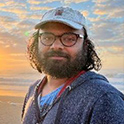
Anirban Bhaduri (2023-2024)
The peer mentoring program is one of the many interesting experiences of my teaching
journey. I believe my experience as an instructor of record really helped me guide
my mentees through several hidden challenges that novices are usually unaware of.
Me, along with my fellow mentors, were able to understand the struggles better and
were hopefully able to provide some relief. I also cannot deny the fact that there
were several instances in the program where I was able to learn methods and tricks
and add to my own teaching practices. I first learned about this program as a novice
from my mentors and saw this as an excellent opportunity to hone my skills as an instructor.
As a novice myself, I found many new challenges on my way and each time I had the
mentors to reach out to. I believe I was able to provide the same space for my mentees
and was able to make a difference. This program also helped me lead meetings and discussions,
constructively analyze different teaching practices and provide feedback as and when
needed. I think all graduate students, who aspires to teach mathematics someday, should
try to be a part of this program as it becomes a valuable part of your overall teaching
experience and your growth as an educator.

Anirban Ray (2023-2024)
The mentorship program had significantly helped me grow not only as an instructor
but also as an individual teaching me the principles of perspective and that every
day , every encounter is an opportunity to learn. The first time I sat in a small
group meeting with my mentor, I had a sense of reverence and hierarchical respect
for my mentor hoping to learn new tricks and techniques however, the small group meetings
turned out to be even more, instead of being handed over tricks and solutions, the
meetings became more of a self-exploration into our own teaching philosophies. A principle
that is also efficient in a math classroom. Therefore, I had to become a mentor and
impart the same experience to others. When I started as a mentor, I was amazed and
elated at how much I was learning from the mentees, thus enriching me as a teacher
even more and learning new perspectives. The mentorship journey from mentee to mentor
was truly an enlightening one making me not only a better teacher but a better human
being.

Victoria Chebotaeva (2022-2023)
"The Mentor program is not only about helping second years to teach their own course,
but about critical reflecting. I like how our meetings birth new interesting questions
or ideas we can all think about. I try to prepare them for some challenges they could
have in the class. I like how observations and post-observations talks help peers
to make class more comfortable for them to teach and their students to study. We
are learning how to teach from each other. While I help them to reflect on their own
teaching process, I am reflecting on mine."
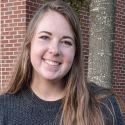
McKenzie Black (2022-2023)
"The peer mentor program has been an irreplaceable part of my journey as an educator.
Starting as a novice instructor, having the support from not only my peer mentors
but also my fellow novice instructors encouraged me to try new approaches and feel
validated in my struggles as a first-time instructor. As a peer mentor, I was able
to share my passion for teaching while also learning from the novice instructors.
While observing other instructors, I was able to see new teaching and class management
techniques that I then implemented into my own classroom. I hope to continue supporting
and learning from my fellow educators at USC!"
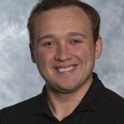
Bailey Heath (2022-2023)
"Serving as a peer mentor broadened my horizons as an educator through the critically
reflective conversations about teaching that I had with fellow graduate students who
brought unique experiences and perspectives to the table. Observing and discussing
other instructors’ teaching helped me to critically reflect on my own teaching, as
I better understand what to look for during class and what questions to ask myself
about a lesson. The professional development and the opportunity to provide feedback
to fellow graduate student instructors challenged me to distinguish between teaching
practices that are more universally beneficial/detrimental and those that are simply
personal preferences. I am thankful to be a part of a teaching community that inspires
each other, supports each other through difficult situations, and challenges each
other to grow, and I hope to continue fostering such a community in the future!"

Thomas Hamori (2022-2023)
"The mentor program was an indispensable resource for me as a novice instructor. Meeting
with other first-time instructors under the leadership of a more experienced colleague
made me feel like I had the support that I needed to accelerate my growth in the classroom.
I did not expect that serving as a mentor myself would have nearly as big an impact
on my teaching. As others have mentioned, I found that observing others has helped
me become even more critical and reflective regarding my own teaching."

Robert "Scotty" Groth (2021 - 2022)
"As a novice, my experience as a mentee was absolutely indispensable in terms of my
development as a graduate student and instructor. In addition to functional and hands-on
tools and approaches we could immediately apply the classroom, the group meetings
acted as a structural and predictable touch base with my peers. I was able to get
feedback on the issues I was experiencing and glean immediate insight from the successes
and difficulties my fellow grad students. Most importantly, the meetings provided
a sense of community, and a commitment toward our common cause of becoming better
teachers. From this strong foundation, I was ecstatic to become a mentor myself, and
can only hope I had as powerful an impact on my mentees as my mentors had on me. As
a mentor, my teaching and pedagogical outlook were strongly impacted by my mentees'
approaches, struggles, and successes. As a novice, I was honing my own craft, now,
as a mentor, I was helping others hone theirs! In addition to broadening my own skillset
in the classroom, my experience as a mentor deepened my appreciation, and recognition
of diverse and varied perspectives on what it means to teach, and to teach effectively."
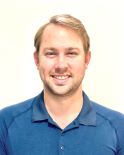
Tommy Luckner (2021-2022)
"As a mentor in the mentor program, you become an instructor of pedagogy for many
first-year instructors. In the paper, "The relative benefits of learning by teaching
and teaching expectancy", L. Fiorella and R. Richard confirmed that preparing to teach
and, more so, teaching to others (the protégé effect) enhances learning when compared
to traditional learning and studying. I mention this paper since being a mentor has
helped me explore new ideas in teaching and develop a deeper understanding of learning
that I had been missing before the mentor program. Not only this, but the mentor program
provided continued professional development that helped solidify many new strategies
in my teaching. Furthermore, sharing and coordinating discussion amongst small groups
of first-year instructors our growing knowledge of activity learning strategies and
teaching ideologies has helped everyone in the groups, including myself, overcome
obstacles in the classroom and improve as educators."
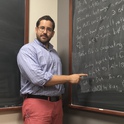
Jack Dalton (2020-2021)
"The mentor program had a bigger effect on my teaching than any other professional
development here at UofSC. One of the best ways to learn something is to try to teach
it to someone else. Some honest viewpoints about teaching came out in the critical
reflection group meetings as well as some fun ideas. That year was tough with the
pandemic. Having both the meetings with Dr. Yee and the other mentors, and the observations
and small group meetings with the novices, helped mitigate the loss of the sense of
community in the math department. It was also rewarding seeing progress based on my
constructive feedback in the novice instructors’ teaching. It felt like I was indirectly
helping the undergraduate students in the classes I was observing. I wish I could
participate again! "
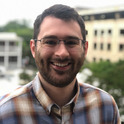
Drew Meier (2020-2021)
"The mentor program created a platform for both fledgling instructors and myself to
challenge biases and develop new ideologies about teaching. The conversations were
both encouraging and challenging which provided us with a breeding ground for growth.
The mentor program has been an invaluable experience for me which developed leadership
skills, taught me how to lead productive conversations in a professional environment,
and improved my own teaching practices. Above all else, I loved seeing the improvement
from the graduate student instructors in my mentor group throughout the semester.
"

Cuyler Warnock (2020-2021)
"The mentor program provided a platform for me to engage in meaningful discussions
about teaching mathematics with novice instructors. These discussions helped the mentees
gain new skills and confidence in the classroom and helped me gain leadership skills
and practice with conducting productive discourse on teaching. Additionally, the program
challenged me to evaluate and improve my own teaching strategies. I am grateful to
have participated in a program that creates a supportive, growth-fostering environment
for both mentors and mentees."

Joseph Foster (2019-2020)
"To both mentors and mentees, the peer mentor program provides a wealth of opportunities
to explore, discuss and reflect on all aspects of teaching. Conversations with a diverse
group of new educators forces one to challenge their internal beliefs and ideologies
to discover the type of teacher they are, whilst opening windows into new insights
that may otherwise have gone unnoticed. You will continue to develop as a teacher
throughout your career, the mentor program is great jump start to that growth, giving
you an advantage over other new professionals as you transition from a graduate student
to a faculty member."
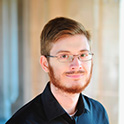
Jacob Juillerat (2019-2020)
"Training to be a mentor has helped push me as a teacher by showing me how to critically
reflect on my teaching practices. I look forward to helping guide novice instructors
as they face challenges, and learn some new techniques to implement in my classroom."
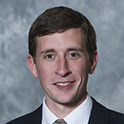
Jeremiah Southwick (2019-2020)
"I appreciate the mentoring program because it provides a framework to observe another
instructor and then aid that colleague in their development as an educator. This is
valuable both for the novice being observed and for myself, because it gives me a
better idea of the questions I should be raising in my own mind as I approach the
task of teaching in my own classroom."
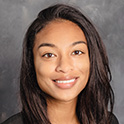
Candace Bethea (2018-2019)
"The most valuable aspect of the mentor program for me is the chance to discuss teaching
in a friendly environment in the small group meetings. Sharing ideas about both the
difficulties and the exciting parts about teaching with people coming from different
backgrounds and experience levels gave me a platform to think more about my own teaching
beliefs and practices. Furthermore, being able to plan and, to an extent, lead meetings
gave me invaluable leadership experience"
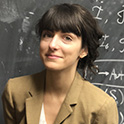
Alicia Lamarche (2018-2019)
"The peer mentor program has helped me grow as both a learner and a teacher of mathematics.
Besides providing much needed guidance during my first semesters as an instructor,
it has fostered a supportive teaching community within our math department."
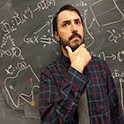
Robert Vandermolen (2018-2019)
"Working so closely with and observing novice teachers has helped me develop classroom
engagement and management techniques that I would not have seen working alone. Also,
guiding the novices with active reflection has been extremely rewarding in many ways
from helping novices push themselves to discovering new ideas and questioning assumptions
together. Additionally the PD ran by Dr. Yee will help me reflect on and push my teaching
for the rest of my career."
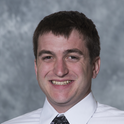
Duncan Wright (2018-2019)
"The mentor program has given me many skills, both teaching and non-teaching, that
I would not have acquired elsewhere as a graduate student.
Through the professional development involved while preparing to become a mentor,
I have learned not only what types of active-learning techniques can be implemented
in the classroom and their benefits to the students, but I have also learned how to
implement these techniques and incorporate them into a lesson plan.
I have also learned how to facilitate discussions about teaching practices and philosophies
with other Graduate Student Instructors, allowing me to support a culture of collegiality
at the university. The entire experience working with Dr. Sean Yee, the other mentors
and the novices has helped me develop as an educator and I will use the lessons I
have learned as a colleague and faculty member wherever life takes me next."
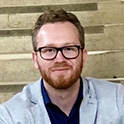
Gregory Clarke (2016-2018)
"The mentorship program fostered an inclusive, teaching-centered culture where novice
instructors could discuss teaching problems, solutions, and philosophies. As a mentor,
I observed graduate student instructors apply the teaching practices we previously
discussed in group meetings to more actively engage students in the classroom."
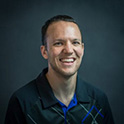
James Sweeney (2016-2018)
"The mentoring program was vital in educating me how to discuss teaching with my peers.
It also turned me into a more reflective teacher that can think critically about past
classes and use my own observations to improve my courses. Finally, the program gave
me several new tools to use in the classroom to increase student engagement. The lessons
learned in the mentoring program will continue to influence my teaching decisions
for years to come."

Alexander K. Wiedemann (2016-2018)
"'This program has certainly caused a shift in the department's teaching culture.
Indeed, it is now common to see cooperative development of teaching practices, even
outside the formality of the mentor meetings. I have learned so much, and strongly
believe that my teaching has become more effective and efficient as a result of this
culture of critical reflection of teaching practices. There is little debate on the
importance of allowing students to reflect, practice, and work cooperatively, so it
is exciting to see this trend carry upward to the instructors themselves."




















